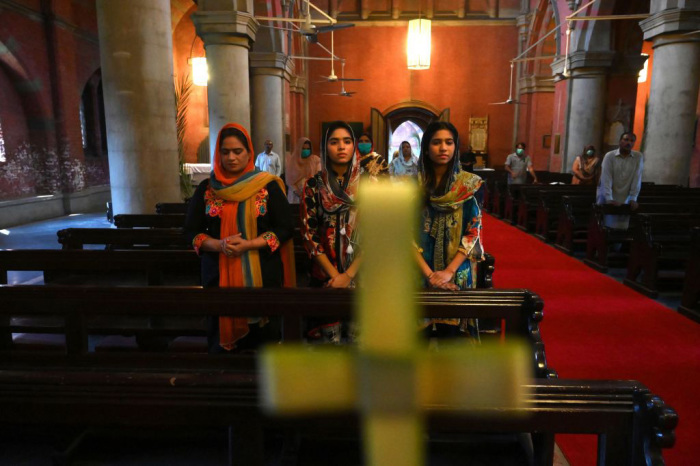Pakistani Christian family beaten for saving 13-y-o daughter from kidnapping by Muslim extremists

A young Pakistani Christian girl was nearly abducted from her home earlier this month when a radical group of Muslim men attacked her entire family, according to a U.S.-based Christian persecution watchdog.
International Christian Concern reported the near abduction of the 13-year-old daughter of Aslam Masih and Noreen Bibi in the Christian-majority neighborhood of Sadigabad in Pakistan's Punjab province on July 12.
Masih and his family were violently attacked by a mob of 12 men who broke into their home and tried to kidnap his daughter, Noor, and force her into a marriage. In Pakistan, it's estimated that hundreds of women and girls are kidnapped, forced into marriage and forcibly converted to Islam each year.
According to ICC, a man named Muhammad Irfan led the group of armed men. Bibi told the organization that Ifran would often express sexual interest in her young daughter.
“He [Irfan] often teased and disturbed my daughter in the streets, but we always ignored,” Bibi recalled. “Finally, Irfan forcibly entered into my house and intended to kidnap my daughter. However, we resisted. In response, he attacked and beat my entire family who got multiple injuries.”
According to Bibi, her husband was injured in the attack and hasn't received medical care to treat his wounds.
“[P]olice have not registered the case against Irfan and medical staff have not provided medical aid to the injured,” Bibi was quoted as saying.
Irfan's threats have also continued despite the family’s resistance. Bibi also said that Irfan’s supporters have threatened to burn down their home and cause further harm if the family pursues legal action.
Despite the immense number of crimes committed against Christians in Pakistan, those facing persecution rarely see justice in the legal system, according to ICC Advocacy Director Matias Perttula.
In Pakistan, a Muslim-majority country, courts are consistently pressured by mobs of civil unrest to make decisions based on Islamic law instead of government code, he told The Christian Post.
“Even though extremists are a minority in terms of population, they still wield major political power in the country,” Perttula said. “If the judge rules in favor of a Christian woman, these people will incite mob violence on the Christian community and attack the Christians there. They’ll show up at the courthouse to intimidate the judge.”
Perttula cited an abduction case involving 14-year-old Huma Younus, who was taken from her home last October, to describe how kidnapping, rape and forced conversions are handled to provide perspective on Pakistani justice issues.
Younus was kidnapped at gunpoint by a man she worked for and was subsequently raped, forcefully converted to Islam, forced into marriage, and impregnated by her kidnapper.
According to state law, Younus was not of age to consent to marriage or sexual relations, thus making the forced marriage illegal. However, the Sindh High Court in Karachi earlier this year ruled in favor of the kidnapper and reasoned that since Younus had already experienced her first period, she was of legal age.
“I met with Huma’s parents. Legal documents were provided proving she was 14,” Perttula said. “The courts still sided with the kidnapper. Because of her period, she was fit. They completely ignored the consent law.”
Perttula also said that Younus’ case, and more recently Masih’s daughter, are “like one example of a sea of hundreds of these stories that happen.”
Estimates cited by the U.S. Commission on International Religious Freedom in its annual report suggest that as many as 1,000 women and girls are forcibly converted to Islam each year in Pakistan, many of whom are kidnapped, forced into marriage and raped.
Injustice and intimidation tactics do not begin with court decisions though, and oftentimes never reach a court. The biggest danger Christians, Hindus, and all minorities face in Pakistan is an accusation of blasphemy, Perttula said.
Pakistani life is largely influenced by honor culture. If a person is accused of blasphemy, even if the claim is proven false, honor is lost for the individual and family, which can cause hardship in both personal and professional ways.
As Pakistan’s blasphemy laws are often abused by some Muslims to settle personal disputes with religious minorities, dozens of people are jailed for blasphemy in Pakistan. Some have even been sentenced to the death penalty.
The lives of young women who are victims of rape, kidnapping and other traumas face harsh aftermath as well. Due to the honor culture, women are seen as “unclean” or “damaged” due to no fault of their own.
“It makes a woman’s prospect for marriage difficult. Most of the time they are welcomed back by their family but with an element of shame, which is heartbreaking,” Perttula said. “The mere accusation of this or blasphemy has tainted your life for life, essentially, and the community may not welcome you back.”
Earlier this month, ICC also reported on a video posted to YouTube showing an extremist Pakistani Muslim cleric declaring that “Christians have no right to live in this Islamic country.”
“I want to let you know that these people [Christians] are the worst infidels of the universe,” the Muslim cleric was quoted as saying.
Religious minorities, especially individuals facing blasphemy threats, also face difficult working conditions and unfair job opportunities, Perttula stressed.
Many of these people work in sanitation services and are not provided with proper equipment or clothing to perform jobs involving sewage.
The U.S. State Department has designated Pakistan as a “country of particular concern” for engaging in or tolerating egregious and systemic abuses of religious freedom. Pakistan has also been ranked as the fifth-worst country in the world when it comes to Christian persecution on Open Doors USA’s 2020 World Watch List.




























